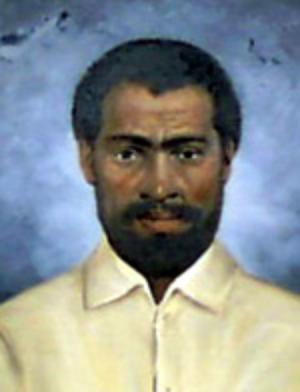Nat Turner: An Emblem of Freedom
Nathaniel “Nat” Turner was born into slavery on October 2, 1800 in Southampton, Virginia, a majority black area due to the surrounding plantations. He received his education with the permission of his slave master, Benjamin Turner, and learned how to read and write. Along with reading and writing, Turner also learned about Christianity and religion, later becoming a preacher and a strong voice for the slaves on the Turner plantation and Southampton County. Always serious, people in the neighborhood referred to him as “The Prophet.” He was oftentimes spotted fasting, praying, and reading the bible. His beliefs led him to run away at twenty-two, only to come back after a few months due to having a revelation, thought today to have been about the future freedom of slaves.
Turner believed that he was chosen by God to bring about Judgement Day and lead his people to freedom, and decided, based upon an eclipse of the sun, that it was time for slaves to fight back. Before the rebellion on August 21 transpired, Turner said, “I heard a loud noise in the heavens, and the Spirit instantly appeared to me and said the Serpent was loosened, and Christ had laid down the yoke he had borne for the sins of men, and that I should take it on and fight against the Serpent, for the time was fast approaching when the first should be last and the last should be first.” Further information suggests that Turner might have had deeper motives for organizing the revolt: Virginia legislators had been writing laws that denied free blacks the right to jury trials and that allowed them to be removed and re-enslaved.
Turner is said to have gained followers for the rebellion by meeting in the woods and encouraging other slaves to join by singing songs that had migrated from plantation to plantation. Turner asked four other field slaves, Hark Travis, Nelson Williams, Henry Porter, and Sam Francis, to join him on his journey and planned the beginning of the rebellion for August 21, 1831. When the day came, Turner and his friends killed the Travis family, to whom they were enslaved at the time, securing the plantation’s horses and weapons. They then moved to gather over seventy-five slaves by going from plantation to plantation over the course of a week. The group killed whites by using quiet weapons, such as knives or hatchets, resulting in the deaths of over fifty white people.
Turner resorted to hiding out in the woods until he was discovered on October 30, 1831 by Benjamin Phipps. He was executed alongside sixteen of his followers a month later on November 11. Following the uprise, whites organized militias to suppress Turner’s followers and killed more than two hundred freed blacks and slaves on their marches who they believed to have participated in the rebellion. Due to the fear that arose among slave owners in the South, stricter and harsher laws and restrictions were placed on freed and enslaved blacks, such as limiting their education.
In 1831, Thomas Ruffin Gray wrote the book, The Confessions of Nat Turner, based on the information gathered while conversing with Turner when he was in hiding and in jail. Much of the information known today about Turner is pulled from those encounters. At the National Negro Convention in 1843, Henry Highland Garnet referenced Turner as “patriotic” and encouraged his image as an emblem of the abolition movement. Turner is remembered today through his mention by many pop-culture artist, such as hip-hop artist J. Cole in his song “Folger’s Crystals,” and books, such as Alex Haley’s novel, Roots. The 1967 novel, The Confessions of Nat Turner, won 1968’s Pulitzer Prize, but is critiqued as racist because of its stereotyping of slave rebellion leaders as irrational and rash. Although that stereotype of Turner continues to exist, he is also viewed as an emblem of liberty and justice. Turner still serves as a symbol of revolution for leaders and thinkers concerned with today’s civil rights movement, as T.D. Williams displays in his article, “What Would Nat Turner Do?”
For more information, visit:
www.history.com/topics/black-history/nat-turner
http://www.encyclopedia.com/topic/Nat_Turner.aspx

